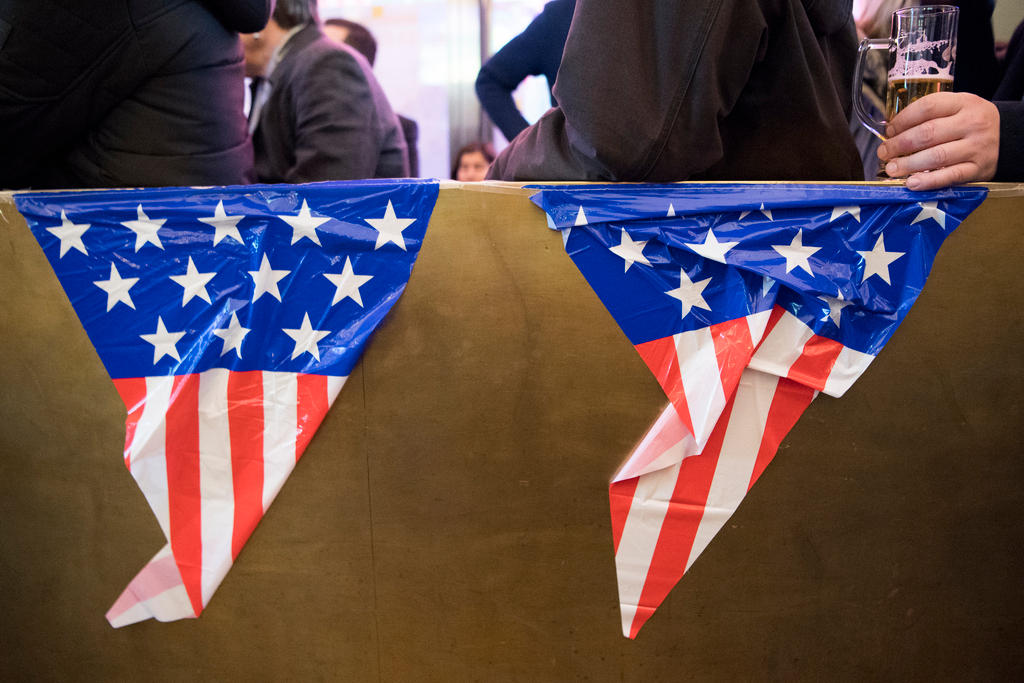‘Swiss farmers could make a lot more money selling to the US’

The American ambassador to Switzerland believes the agricultural sector has evolved to make room for a potential US-Swiss free trade deal. He also put the onus on Switzerland to move talks forward.
Earlier this month, Switzerland’s outgoing Economics Minister Johann Schneider-Ammann sought a rendezvous with America’s lead trade negotiator during a trip to Washington, DC. He ended up meeting the negotiator’s deputy, which some in the Swiss press called a snub and a reason why Schneider-Ammann returned without a significant breakthrough towards formal trade negotiations.
But Edward McMullen, US Ambassador to Switzerland and Liechtenstein, calls the idea of an American snub “absurd”. With US Trade Representative Robert Lighthizer called into last-minute talks on resolving the US’s ongoing trade row with China, McMullen says he “figured [the US trade office] would cancel the meeting” with Schneider-Ammann.
“Just the fact that the meeting happened is representative of the priority our government has put on making sure we have this conversation,” he told swissinfo.ch in an interview.
Talking trade with farmers
It’s now up to Schneider-Ammann’s successor in the economics ministry, Guy Parmelin, to continue trade discussions with the United States. As a professional winegrower, Parmelin is a member of the Swiss agricultural community that is credited with burying a US-Swiss free trade deal attempt in 2006. McMullen says he welcomes the chance to work with a farmer on free trade.
“If there is going to be a negotiation, having someone who can speak to the most reluctant of those in Switzerland and give them a credible assessment will be of value,” McMullen said of Parmelin.

McMullen believes that demand for specialty agricultural products has evolved in the past decade in both Switzerland and the US to make a free trade deal more interesting to farmers.
“Swiss farmers could make a lot more money selling to the US than they do now,” he argues, citing a new US appetite for Swiss products such as cheese and wine.
Still, he says he has personally met many Swiss farmers who “fear inevitable changes that will happen in their lives” because of free trade. When top Swiss trade diplomat Marie-Gabrielle Ineichen-Fleisch travelled to the US for trade discussions in October, she told the media that complete agricultural free trade between the countries would be “unacceptable” for Switzerland’s farming sector.
But McMullen says farmers “get it” when he explains to them the “bigger picture” of a trade agreement and the fact that agriculture is “just one small component” of a potential free trade deal, which would also affect industries like pharmaceuticals and manufacturing.
When asked about competition between Swiss cheese exporters and those making similar products in certain regions of the US – some with similar names – McMullen said that issues about protected-label products have not come up in trade talks so far. He says he believes there is room for cheese products from both Switzerland and the United States in the US market.
American food on Swiss plates
In a recent interview with the Basler Zeitung newspaper, Swiss Farmer’s Association President Markus Ritter said that Switzerland has “higher standards and expectations” than the US when it comes to animal welfare, environmental requirements and genetic engineering in the food sector. He expressed concern over guaranteeing those standards if more US food imports were to enter Switzerland through a free trade deal – also an issue in the 2006 trade negotiations.
McMullen argues that the United States has “a much stronger Food and Drug Administration (FDA) than the Swiss could ever imagine…Americans are certainly not eating foods that are detrimental to their health.”
The US ambassador says that instead of concerns over food safety, he most often hears people in Switzerland asking him when they will be able to buy more US beef, for example.
“Swiss beef farmers have nothing to fear,” he said. “They have a strong market and are doing very well. Opening up the market for a bit of American beef or whatever may come up is not going to be very controversial, I don’t think.”
Tariff questions
US President Donald Trump has delivered mixed messages on the issue of tariffs, introducing import duties on aluminum and steel in March before declaring there should be “no tariffs and no barriers” at the G7 Summit in June.
When asked whether such mixed messages and tariff announcements have made trade talks between Switzerland and the US more difficult, McMullen argues that most tariff issues “have been China-focused”.
“There is pain in having conversations about trade that are difficult to have, but Switzerland is not one of those countries where there have been [trade balance] problems with the US. We have never had issues with Switzerland.”
In July, Switzerland initiated a World Trade Organization dispute settlement procedureExternal link following President Trump’s announcement steel and aluminum tariffs. Switzerland exported steel products worth about CHF80 million ($80.5 million) last year.
Earlier this month, the WTO announced a special panel would hear Switzerland’s complaint against the US.
Switzerland also sought a country exemption from the tariffs, but it has not been granted so far. Certain businesses active in the US seeking to import Swiss steel and aluminum products requested and have been given so-called product exclusionsExternal link to the Trump administration tariffs, which apply only to specific products.
McMullen says that ultimately, because steel and aluminum are not big industries for the Swiss, the tariff issues are “inconsequential in the bigger picture of how a free trade agreement would affect the economies of both countries”.
Moving forward
Over the summer Edwin Feulner, former president of the conservative US think tank The Heritage Foundation, wrote that “it’s time for a free trade agreement with Switzerland”External link and “the sooner, the better”. The Swiss-American Chamber of Commerce echoed his sentiments, arguing thatExternal link “We need a Swiss-US free trade agreement now!”
Swiss parliament recently voiced its support for a trade deal, with Switzerland’s senate voting on December 6 to call on the government to “seek a free trade agreement or at least a preferential trade agreement with the USA”.
But McMullen doesn’t see a need for speed in moving talks forward.
“If the Swiss are eager to have a dialogue and conversation, we’re eager to do it with them and at their pace,” he says. “The ball is in Switzerland’s court.”
“We’re eager to continue the dialogue and move the ball forward, and as far as we’re concerned it’s moving along very well.”

In compliance with the JTI standards
More: SWI swissinfo.ch certified by the Journalism Trust Initiative













You can find an overview of ongoing debates with our journalists here . Please join us!
If you want to start a conversation about a topic raised in this article or want to report factual errors, email us at english@swissinfo.ch.